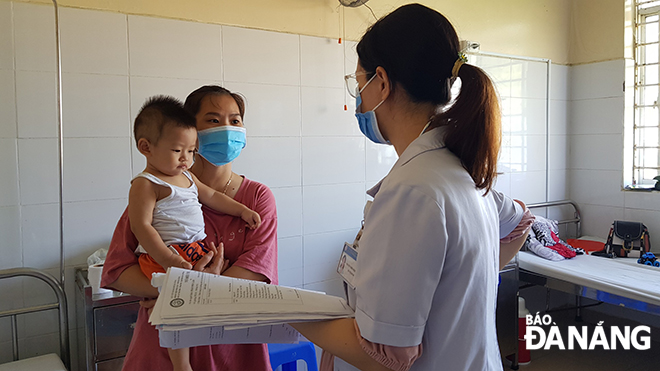Da Nang calls for public engagement in countering dengue virus infection
The Da Nang government has warned local residents of complex situation of dengue as the city is witnessing a continuous rise in the number of dengue patients, the majority of whom are children. Hence, the municipal administration is calling on each family and all people across the city to join hands with authorities at their local areas to prevent dengue fever. Parents are advised to watch for signs and symptoms of severe dengue in their children and immediately take them to healthcare facilities for having timely access to care and treatment.
 |
| A doctor at the Da Nang Obstetrics and Gynecology Hospital examining a child with dengue fever. Photo: PHAN CHUNG |
Signifcant increase in number of paediatric cases
According to the data provided by the Da Nang Department of Health, the city has recorded a total of more than 3,600 dengue cases, including 1,400 cases that are aged less than 15 years, so far this year, 146 times higher than the same period in 2021. The districts reporting most cases are Lien Chieu (1,096), Thanh Khe (547), Cam Le (591), Hoa Vang (603), and Hai Chau (273).
The Department of Tropical Medicine and Infectious Diseases of the Da Nang Obstetrics and Gynecology Hospital receives inpatient treatment over 80 paediatric of dengue fever every day.
According to Doctor Nguyen Hai Thinh, the Head of the hospital’s the Department of Tropical Medicine and Infectious Diseases, dengue fever, also known as breakbone fever, is a mosquito-borne infectious tropical disease caused by the dengue virus. Symptoms include fever, headache, muscle and joint pains, and a characteristic skin rash that is similar to measles. In a small proportion of cases, the disease develops into life-threatening dengue hemorrhagic fever, which results in bleeding, thrombocytopenia, and leakage of blood plasma, or into dengue shock syndrome, in which dangerously low blood pressure occurs. Shock syndrome is a dangerous complication of dengue infection and is associated with high mortality. Severe dengue has a higher risk of death when not managed appropriately.
Doctor Thinh remarked that there is no specific treatment for dengue/severe dengue and the best way to prevent dengue fever is to take steps to avoid mosquito bites.
The vast majority of dengue cases are children less than 15 years of age. Dengue causes a spectrum of illness from mild fever to severe disease with plasma leakage and shock. Infants and children with secondary heterologous dengue infections are most at risk for severe dengue disease. The characteristic symptoms of dengue are sudden-onset fever, headache (typically located behind the eyes), muscle and joint pains, and a rash. Children are more likely to have atypical presentation, often experiencing symptoms similar to those of the common cold or gastroenteritis (vomiting and diarrhea). Children are also at greater risk of severe complications although their initial symptoms may be mild.
Doctor Thinh said that many pediatric patients were hospitalised with severe dengue as they entered the critical phase on the 3rd to 7th days after the first sign of illness, and they went into shock due to gastrointestinal bleeding.
Parents are advised to watch for signs and symptoms of severe dengue in their children.Doctor Thinh highlighted the need to immediately go to a local clinic or emergency room if you or a family member has any of the following symptoms: belly pain, tenderness, vomiting (at least 3 times in 24 hours), bleeding from the nose or gums, vomiting blood, or blood in the stool, feeling tired, restless, or irritable.
Doctor Thinh emphasized the necessity of protecting children from mosquito bitess with a focus on controlling the environment and the use of mosquito repellents at all times. In addition, special attention should be given to making sure that your children are sleeping under the net at all times, day and night.
A call to eliminate mosquito breading sites to prevent dengue fever
Given the situation, the Da Nang government has already urged the entire community and all sectors of society to work together to eliminate mosquito breeding sites, particularly those around the home.
A campaign is being launched across the city in a bid to kill mosquito larvae while the local authorities are calling residents to actively get involved in protecting themselves against dengue fever at home by destroying the possible mosquito breeding sites such as water tanks, utensils, irrigation ditches and drainages as well as disposable tires and wastes.
Doctor Truong Van Trinh, the Deputy Director of the municipal Department of Health said that prevention is still the best way to fight dengue. He stressed the need for surveillance activities that include vector surveillance and monitoring of environmental and social risk factors for dengue outbreaks to ensure that increased dengue transmission is detected early and that the response is rapid and appropriate.
Da Nang People's Committee Vice Chairwoman Ngo Thi Kim Yen stated that the most effective way to combat it is to eliminate breeding sites in order to prevent the mosquito from reproducing because without mosquitoes there would be no transmission of dengue.
Mrs Yen is urging all families to get rid of all unused objects where water can accumulate, such as old tires, cans, bottles and vases. Heed should be paid to clearing brush around the home, cleaning up stagnant ponds while domestic water tanks must be hermetically sealed to avoid them becoming hatcheries. She remarked that eliminating hatcheries would hit the mosquito hard by interrupting its breeding cycle, therefore reducing the mosquito population.
Reporting by PHAN CHUNG – Translating by H.L








